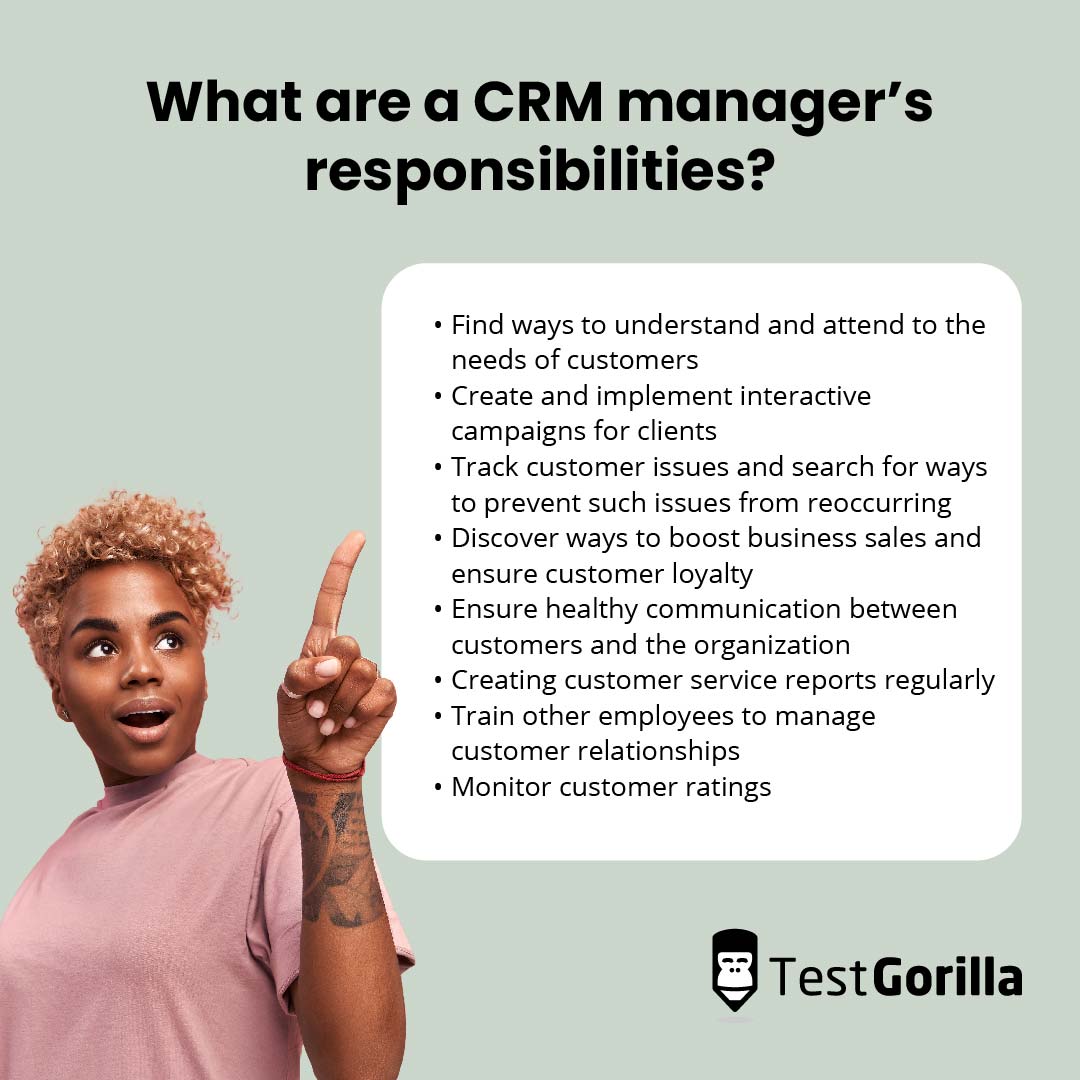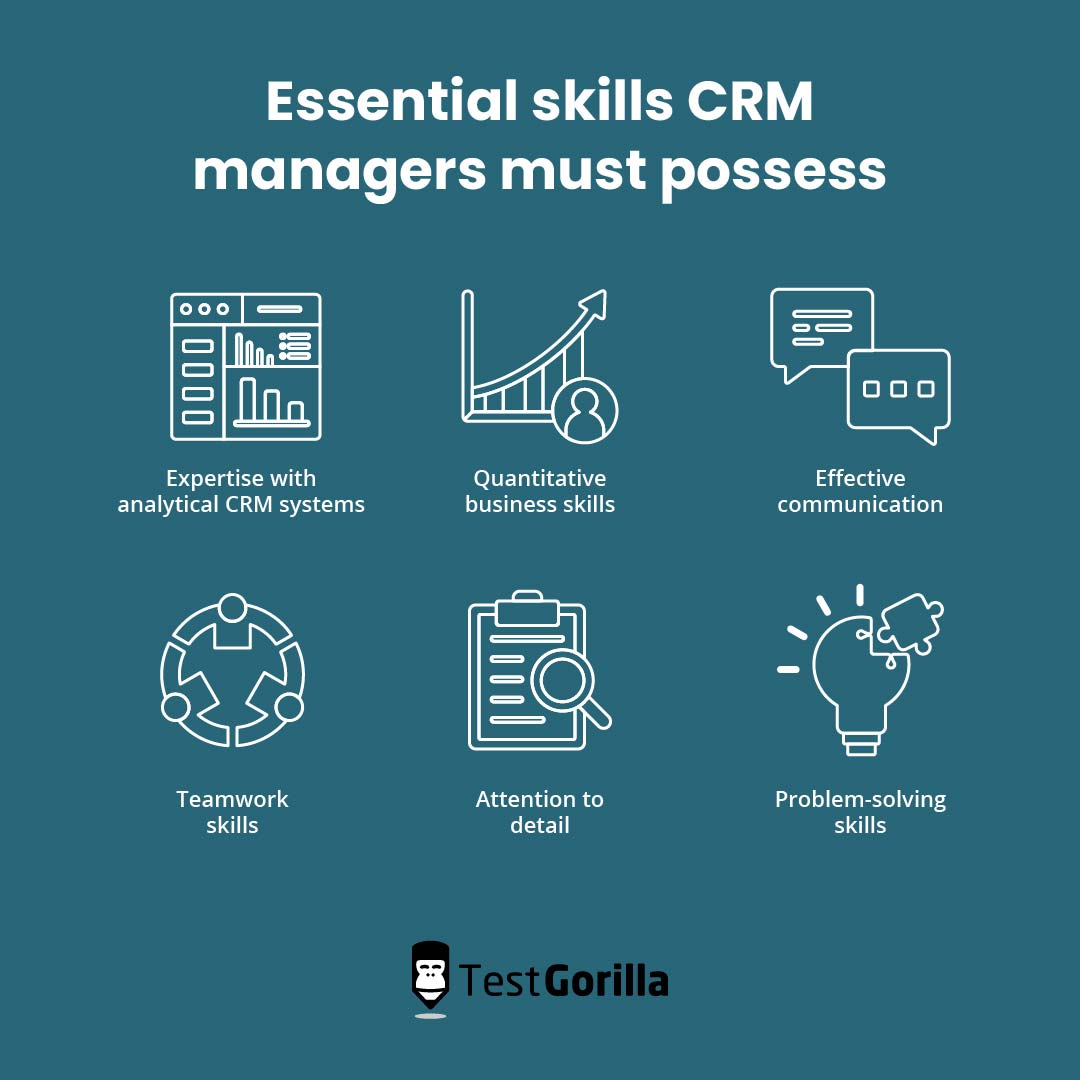It’s crucial to recognize the importance of maintaining stable customer relationships. Customers are the reason your business exists, so how your customers perceive your company determines how successful it will be.
If you work for an organization that values its customers, you need to hire professionals who can sustain customer relationships and bolster your success. However, to hire the right CRM managers, you must understand their roles and skills so that you know exactly what to look for.
In this article, we will explain what customer relationship management is, what CRM managers actually do, and the skills they require to be great at their job.
Who is a CRM manager?
Customer relationship management (CRM) is a system that manages a company’s interactions with its clients. The goal of CRM is to establish and improve customer relationships to help the business achieve its goals.
A CRM manager is responsible for creating and implementing CRM strategies that enable the organization to maintain a healthy relationship with its clients.
Great CRM managers have extensive knowledge of and expertise in various CRM platforms and can identify which one would best suit their company’s needs. They possess technical and non-technical skills that help them complete their work effectively.
Typically, CRM managers earn an average annual salary of $78,144. However, the exact amount varies according to the CRM manager’s experience and level of specialization.
What are a CRM manager’s responsibilities?
CRM managers maintain the relationship between an organization and its clients. They primarily use CRM systems to ensure that clients have a great experience with the company and have no complaints about its services.
Besides their primary role, CRM managers also perform other functions that affect how customers perceive the company and its services. Below, we will discuss the responsibilities of CRM managers in detail:
1. Find ways to understand and attend to the needs of customers
Research is one of a CRM manager’s major responsibilities. To relate well with clients, they must pay attention to detail to find ways to understand their needs and how the organization can best meet them.
CRM managers often use surveys to gain insight into clients’ problems and expectations. This way, they can find the best methods to attend to them and ultimately increase their loyalty to the business.
2. Create and implement interactive campaigns for clients
CRM managers use analytical CRM systems like HubSpot and Zoho to create interactive campaigns. These campaigns provide a means to follow up with clients and build their relationships with the company.
Additionally, CRM managers work with the IT and CRM teams to create campaigns that focus on the core aspects of customers’ needs and how to satisfy them.
3. Track customer issues and search for ways to prevent such issues from reoccurring
Recurring issues are one of the factors that reduce customer loyalty. To ensure that previously solved problems don’t resurface, CRM managers observe trends and common complaints among clients and find ways to solve those problems.
4. Discover ways to boost business sales and ensure customer loyalty
Efficient CRM managers are critical thinkers. They find ways to draw clients to their organization and ensure that those clients remain loyal, thus boosting business sales and helping the company succeed.
5. Ensure healthy communication between customers and the organization
CRM managers use their knowledge of CRM software to maintain healthy and professional communication with clients. They store and manage customer contacts and regularly check on clients to see if they are satisfied with the company’s services.
6. Creating customer service reports regularly
By creating customer service reports, CRM managers can easily study trends in customer interactions and give feedback to their organization. When they pair these reports with their ability to work with data, they can provide tangible solutions to clients’ issues.
7. Train other employees to manage customer relationships
Another duty of a CRM manager is to train other employees on the best ways to handle customers. In doing so, they ensure that the customers receive top-notch services.
8. Monitor customer ratings
As customers rate the company’s products and services, CRM managers must monitor their ratings to determine how satisfied they are. By monitoring customer ratings, CRM managers can easily identify common problems clients experience.
The best insights on HR and recruitment, delivered to your inbox.
Biweekly updates. No spam. Unsubscribe any time.
Essential skills CRM managers must possess
Like any job role, CRM managers need certain skills to perform well. These skills enable them to relate with their teams and clients and help the organization achieve its goals. Here are some of the vital skills CRM managers require:
1. Expertise with analytical CRM systems
CRM managers use analytical CRM systems like HubSpot and Zoho to handle customer interactions easily and effectively. Thus, expertise with these platforms determines how efficient a CRM manager will be.
2. Quantitative business skills
Part of a CRM manager’s role is creating accurate reports to show how the organization’s customer relationships are progressing over a particular period. To ensure these reports are accurate, they need excellent quantitative business skills.
These skills include numerical reasoning, knowledge of research techniques, analytical skills, and the ability to conduct customer surveys.
3. Effective communication
Communication skills are critical in customer relationship management. This is because CRM managers need to communicate effectively to understand customers and find the best ways to meet their needs.
4. Teamwork skills
CRM managers work in teams to ensure successful customer interactions. Thus, to be productive, they must know how to work with others, share ideas, and propose viable solutions to problems.
5. Attention to detail
For CRM managers to spot customers’ needs, they must be able to pay attention to even the slightest details. This ensures that they build and maintain customer loyalty by resolving issues so that clients don’t experience them repeatedly.
Furthermore, attention to detail helps CRM managers create accurate and concise reports to keep track of their organization’s relationships with clients.
6. Problem-solving skills
Problem-solving skills enable CRM managers to analyze issues and search for permanent solutions to them. These skills help them make sure that clients have a great experience and have only good things to say about your business.
Hire the perfect CRM manager with TestGorilla
Recruiting CRM managers is a delicate task that could make or mar your business, so you can’t risk making hiring errors. Traditional recruitment processes involve sorting through candidates’ CVs to try and find those with the technical and non-technical skills required for the role.
This approach takes a lot of time and effort and leaves room for various unconscious biases. Fortunately, TestGorilla offers various pre-employment tests that can help you eliminate bias and reduce recruitment errors.
TestGorilla’s HubSpot CRM manager test specifically checks candidates’ ability to manage, implement, and co-ordinate customer interactions using the HubSpot platform. Sign up for free with us to access our test library, and start enjoying streamlined recruitment today.
Related posts
You've scrolled this far
Why not try TestGorilla for free, and see what happens when you put skills first.
















